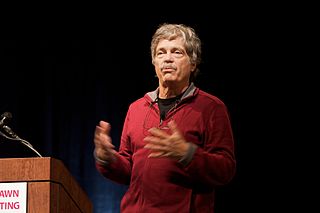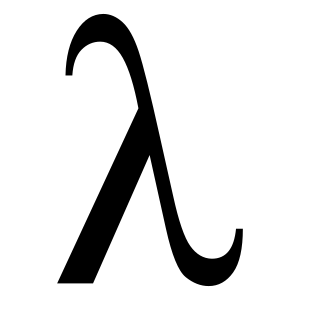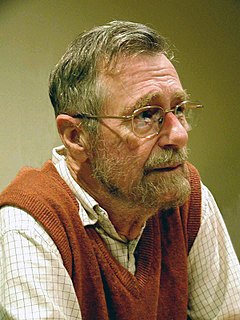
Alan Curtis Kay is an American computer scientist. He has been elected a Fellow of the American Academy of Arts and Sciences, the National Academy of Engineering, and the Royal Society of Arts. He is best known for his pioneering work on object-oriented programming and windowing graphical user interface design.
The Association for Computing Machinery (ACM) is an international learned society for computing. It was founded in 1947, and is the world's largest scientific and educational computing society. The ACM is a non-profit professional membership group, with nearly 100,000 members as of 2019. Its headquarters are in New York City.

Computing is any activity that uses computers. It includes developing hardware and software, and using computers to manage and process information, communicate and entertain. Computing is a critically important, integral component of modern industrial technology. Major computing disciplines include computer engineering, software engineering, computer science, information systems, and information technology.

Computer science is the study of mathematical algorithms and processes that interact with data and that can be represented as data in the form of programs. It enables the use of algorithms to manipulate, store, and communicate digital information. A computer scientist studies the theory of computation and the practice of designing software systems.

Edsger Wybe Dijkstra was a Dutch systems scientist, programmer, software engineer, science essayist, and pioneer in computing science. A theoretical physicist by training, he worked as a programmer at the Mathematisch Centrum (Amsterdam) from 1952 to 1962. A university professor for much of his life, Dijkstra held the Schlumberger Centennial Chair in Computer Sciences at the University of Texas at Austin from 1984 until his retirement in 1999. He was a professor of mathematics at the Eindhoven University of Technology (1962–1984) and a research fellow at the Burroughs Corporation (1973–1984).

Quantum computing is computing using quantum-mechanical phenomena, such as superposition and entanglement. A quantum computer is a device that performs quantum computing. Such a computer is completely different from binary digital electronic computers based on transistors and capacitors. Whereas common digital computing requires that the data be encoded into binary digits (bits), each of which is always in one of two definite states, quantum computation uses quantum bits or qubits, which can be in superpositions of states. A quantum Turing machine is a theoretical model of this type of computer and is also known as the universal quantum computer. The field of quantum computing was initiated by the work of Paul Benioff and Yuri Manin in 1980, Richard Feynman in 1982, and David Deutsch in 1985.
A management information system (MIS) is an information system used for decision-making, and for the coordination, control, analysis, and visualization of information in an organization; especially in a company.

Richard Manning Karp is an American computer scientist and computational theorist at the University of California, Berkeley. He is most notable for his research in the theory of algorithms, for which he received a Turing Award in 1985, The Benjamin Franklin Medal in Computer and Cognitive Science in 2004, and the Kyoto Prize in 2008.
A computer scientist is a person who has acquired the knowledge of computer science, the study of the theoretical foundations of information and computation and their application.

Sir Maurice Vincent Wilkes was a British computer scientist who designed and helped build the Electronic delay storage automatic calculator (EDSAC), one of the earliest stored program computers and invented microprogramming, a method for using stored-program logic to operate the control unit of a central processing unit's circuits. At the time of his death, Wilkes was an Emeritus Professor of the University of Cambridge.

The Department of Computer Science and Technology, formerly the Computer Laboratory, is the computer science department of the University of Cambridge. As of 2007 it employed 35 academic staff, 25 support staff, 35 affiliated research staff, and about 155 research students. The current head of department is Professor Ann Copestake.

Pravets or Pravetz is a town in Pravets Municipality in central western Bulgaria, located approximately 60 kilometres (37 mi) from the capital Sofia. Pravets is home town of Pravetz computers, "Pravetz" is also a surname.

The Courant Institute of Mathematical Sciences (CIMS) is an independent division of New York University (NYU) under the Faculty of Arts & Science that serves as a center for research and advanced training in computer science and mathematics. It is considered one of the leading and most prestigious mathematics schools and mathematical sciences research centers in the world. It is named after Richard Courant, one of the founders of the Courant Institute and also a mathematics professor at New York University from 1936 to 1972.
The Bachelor of Computer Science or Bachelor of Science in Computer Science is a type of bachelor's degree, usually awarded after three or four years of collegiate study in computer science, but possibly awarded in fewer years depending on factors such as an institution's course requirements and academic calendar. In some cases it can be awarded in five years. In general, computer science degree programs emphasize the mathematical and theoretical foundations of computing.
The terms design computing and other relevant terms including design and computation and computational design refer to the study and practice of design activities through the application and development of novel ideas and techniques in computing. One of the early groups to coin this term was the Key Centre of Design Computing and Cognition at the University of Sydney in Australia, which for nearly fifty years pioneered the research, teaching, and consulting of design and computational technologies. This group organised the academic conference series "Artificial Intelligence in Design (AID)" published by Springer during that period. AID was later renamed "Design Computing and Cognition (DCC)" and is currently a leading biannual conference in the field. Other notable groups in this area are the Design and Computation group at Massachusetts Institute of Technology's School of Architecture + Planning and the Computational Design group at Georgia Tech.

The College of Computing at the Georgia Institute of Technology has roots stretching back to an Information Science degree established in 1964. In 1988, Georgia Tech president John Patrick Crecine elevated the School of Information and Computer Science to become the College of Computing, making Georgia Tech the second university to do so, after Carnegie Mellon University created their School of Computer Science.

The School of Computer Science (SOCS) is an academic department in the Faculty of Science at McGill University in Montreal, Quebec, Canada. The school is the second most funded computer science department in Canada. It currently has 34 faculty members, 60 Ph.D. students and 100 Master's students.
The University of Pittsburgh's School of Computing and Information is one of the 17 schools and colleges of University of Pittsburgh located on the university's main campus in the Oakland section of Pittsburgh, Pennsylvania, United States. The school was formed in 2017 with a focus on academic programs that teach contextually situated computing in an interdisciplinary manner. The school offers bachelor's, master's, and doctoral degrees as well as certificate programs and houses three departments: Computer Science, Informatics and Networked Systems, and Information Culture and Data Stewardship.

Scott Joel Aaronson is an American theoretical computer scientist and David J. Bruton Jr. Centennial Professor of Computer Science at the University of Texas at Austin. His primary areas of research are quantum computing and computational complexity theory.
Informatics is a branch of information engineering. It involves the practice of information processing and the engineering of information systems, and as an academic field it is an applied form of information science. The field considers the interaction between humans and information alongside the construction of interfaces, organisations, technologies and systems. As such, the field of informatics has great breadth and encompasses many subspecialties, including disciplines of computer science, information systems, information technology and statistics. Since the advent of computers, individuals and organizations increasingly process information digitally. This has led to the study of informatics with computational, mathematical, biological, cognitive and social aspects, including study of the social impact of information technologies.













